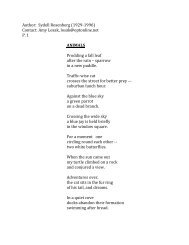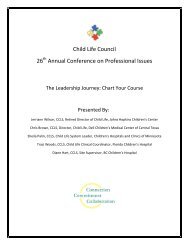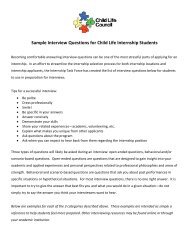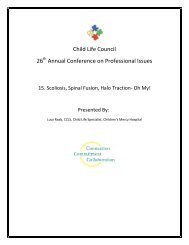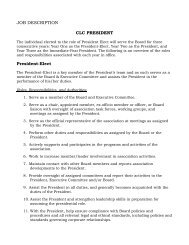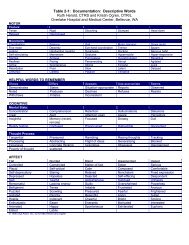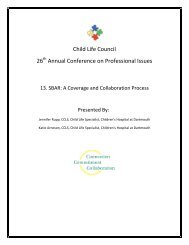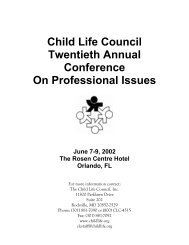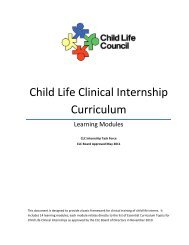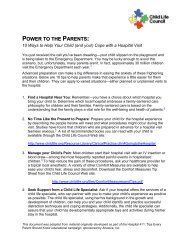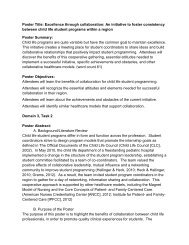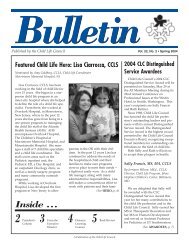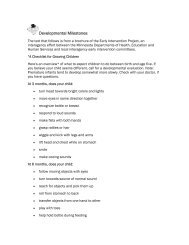Being a Parent and a Child Life Specialist - Child Life Council
Being a Parent and a Child Life Specialist - Child Life Council
Being a Parent and a Child Life Specialist - Child Life Council
Create successful ePaper yourself
Turn your PDF publications into a flip-book with our unique Google optimized e-Paper software.
Perspective<br />
<strong>Life</strong> as a Balance Beam:<br />
Practical Ideas for Balancing Work <strong>and</strong> Home<br />
Michelle B. Riba, M.D., Alissa Riba, Esq., Erica Riba<br />
I<br />
recently attended a physician leadership conference<br />
where the messages were dominated by sLlch themes as<br />
"have fun," "stop <strong>and</strong> smell the roses," "get regular exercise<br />
<strong>and</strong> eat healthy," "stay focused," <strong>and</strong> "collaborate <strong>and</strong><br />
get out of your silo." We were asked to turn off our cell<br />
phones <strong>and</strong> pagers, so at every break there was a mad dash<br />
for the phone. For half the day, I was worried about how<br />
many e-mails, patient call backups, <strong>and</strong> refills I would be<br />
facing at the end. For the other half, I was thinking about<br />
how I could pick up dinner that would not be grossly unhealthy,<br />
whether I missed a deadline on a letter a colleague<br />
needed for promotion, <strong>and</strong> if my daughter drove home<br />
safely from school.<br />
Does any of this sound familiar? It seems that many of<br />
us are multitasking <strong>and</strong> not exactly feeling focused, balanced,<br />
refreshed, or in control. For years, a colleague <strong>and</strong><br />
I have organized a workshop at the American Psychiatric<br />
Association's annual meeting on "<strong>Child</strong>ren of Psychiatrists"<br />
because we found ourselves wondering about the<br />
potential damage that we were doing to our children because<br />
of our careers in academic psychiatry. At the workshop,<br />
we are continually amazed by the honesty <strong>and</strong> forthrightness<br />
of our speakers <strong>and</strong> attendees in reflecting on<br />
how to balance the range of relationships, duties, <strong>and</strong> responsibilities<br />
we all regularly encounter.<br />
Though I believe the presenters at the leadcrship conference<br />
were genuine in their admonitions <strong>and</strong> their goals<br />
were laudable, how do we manage <strong>and</strong> balance our own<br />
various roles <strong>and</strong> responsibilities? How do we provide excellent<br />
patient care, manage to stay up-to-date with our<br />
journals <strong>and</strong> readings, stay on track for promotion, <strong>and</strong><br />
continue to learn <strong>and</strong> grow after we reach our mid- or late<br />
careers, while exercising <strong>and</strong> eating healthy <strong>and</strong> not burning<br />
Received March 22, 2006; revised May 8,2006; accepted June 5, 2006.<br />
Dr. Riba is affiliated with the Department of Psychiatry, University<br />
of Michigan, Ann Arbor, Michigan. Address correspondence to<br />
Dr. Riba, F6236 MCHC/Box 0295, Ann Arbor, MI 48109; mriba@<br />
umich.edu (e-mail).<br />
Copyright © 2007 Academic Psychiatry<br />
out? How do we nourish our relationships <strong>and</strong> help our<br />
children develop <strong>and</strong> mature into happy <strong>and</strong> strong individuals<br />
while also traveling, attending committee <strong>and</strong> dinner<br />
meetings, <strong>and</strong> writing grants? The list of questions is long,<br />
<strong>and</strong> I frankly do not know the answers. Like many things in<br />
life, when I get stuck, I ask my two daughters, Alissa, 29,<br />
<strong>and</strong> Erica, 17, who kindly provided some comments <strong>and</strong><br />
perspectives on the idea of balance (Appendix 1).<br />
Balancing work, family, <strong>and</strong> personal life takes a lot of<br />
effort-it is not easy. It is a very personal subject, but all<br />
of us are seeking the same things-to try to find a way to<br />
juggle the multiple dem<strong>and</strong>s placed on us while at the same<br />
time enjoying life, not getting burned out, <strong>and</strong> doing a<br />
good job. Making the problem even mon: complex, we all<br />
go through different stages in life. Even if we are "balanced"<br />
during one phase, we might not remain so for the<br />
next. A nanny or babysitter we had for 1 year (or 1 month)<br />
decides to go back to school or calls in sick, <strong>and</strong> this sets<br />
us in a tailspin. Since we all have different families <strong>and</strong><br />
different levels of responsibilities at work <strong>and</strong> at home, it<br />
is impossible to generalize. I do think, though, that there<br />
are ways to learn from one another, so I will offer some<br />
suggestions that may be helpful <strong>and</strong> things that have<br />
worked for me over the years.<br />
Practical Ideas<br />
1. Make friends with different jobs. It is very important<br />
to have friends who can serve as a backup for child<br />
care if needed. Just before school starts in September,<br />
school emergency contact cards arrive in the<br />
school packet, <strong>and</strong> parents have to name at least two<br />
adults, other than a spouse or significant other, who<br />
can be counted on to pick up the children in an emergency.<br />
It is a good idea to cultivate friends who have<br />
different types ofjobs/schedules, so that you can complement<br />
one another.<br />
2. Join professional organizations. Doing so affords potential<br />
ways to meet colleagues who can help advance<br />
Academic Psychiatry, 31 :2, March-April 2007 http://ap.psychiatryonline.org 135



